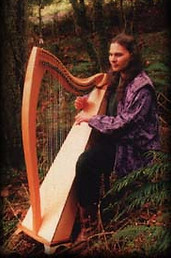
The Epic of Gilgamesh Web Companion



The Recording Process:
First Unit Production and Recording:
David Helfand - Celtic Harp, Dumbek, percussion and keyboards
David Burham - Violin
Recorded at Pro-Arts Studios Eugene, Oregon - Tony Proveaux engineer
Second Unit Production and Recording:
Tony Garone - Vocals and keyboards
Recorded, engineered and mixed at Cow Pilot Studios, Arizona by Tony Garone
An old friend of mine, Mike Jabin, told me Dave Helfand (another old friend of mine) wanted to talk to me. I hadn't talked to Dave for some time (we both grew up on Long Island, NY and moved out west - he to Oregon, I to Arizona). When I contacted him, he told me he had opened up for Robin Williamson of the Incredible String Band, who was Dave's long-time inspiration.

Dave Helfand with his Celtic Harp.
We reminisced a bit, and then Dave told me he was working on a new CD entitled "Beyond the Sea of Reeds" which had a Middle Eastern influence.
"Synchronicity!"
I screamed into the phone. I was working on a CD entitled "The Epic of Gilgamesh," which also had a Middle Eastern influence. He played me a song named, "Caravan" over the phone. I was blown away of course but just as importantly I knew that I could incorporate that song into the Gilgamesh epic, so I could have Dave's beautiful Celtic harp on my CD and contribute to his incredible composition as well.
So I put the idea to Dave that he needed to simply send me his CD when it was completed, I would then take the song (which was an instrumental) and add my vocals to it. As promised, when Dave finished the CD, he sent it to me. I transferred "Caravan" to the ADAT on two tracks. After that I worked on the lyric and recorded the vocal on the remaining tracks and added a few minor parts on the keyboards.
Thanks for an incredible song, Dave!
What is this song about?
One of my biggest problems was setting the stage for the Epic. It was a problem in that I was inclined to give more information than was necessary. That's why, as you may have noticed, there are three songs that set the stage for the Epic of Gilgamesh:
1.Gilgamesh
2.Uruk
3. We are all One
"Gilgamesh" tells you something about the character of the king and his kingdom, "Uruk" speaks to what it might be like where Gilgamesh lived, and "We are all One" introduces you to his gigantic ego. Sorry about this, but I can't help myself. It probably would have been wiser to put these tracks to use as other events in the story, but that's the way I do things.
Actually, Uruk was the Akkadian name for the city (chronologically, the Akkadians came after the Sumerians), the Sumerian name for the city was Unug but Unug is such an ugly name! I wanted the song to sound ancient and have a certain sensuality as well. The image of Gilgamesh lounging on his throne with dancing maidens surrounding him you know, the typical Hollywood faire, was too strong to resist!

This is an artist's conception of what an ancient city such as Uruk in Mesopotamia may have looked like. Typically, people lived in their homes, but slept on the flat roofs at night where the desert breeze cooled them off.
The song does not pertain to a particular tablet but I think it sets the mood. Uruk was a city state of Mesopotamia. It had very high walls which protected it from desert marauders and nomads. Each city of Sumeria had a patron god or goddess and Uruk's was Inanna, goddess of fertility. There also was a temple to Anu, the sky god. The city of Uruk covered an area of 70 hectares (1 hectare equals a unit of area equal to 100 ares - 2.471 acres).

This is a ziggurat, for those of you who are curious. They were typically temples built to the gods. They were primarily made out of mud brick, with mud and straw used as morter. Each Sumerian city had a ziggurat or two dedicated to the deity of that city. Uruk had a ziggurat for Inanna/Ishtar and Anu.
The Cuneiform for "Uruk"

Dr. Pagan explains:
The cuneiform (from left to right) is UNUG-KI. The second sign, KI, is one of the Sumerian determinatives for place names and means "country," or "land." There is a separate determinative for city which is URU, but Uruk was literally an independent city-state, thus the designation "country."